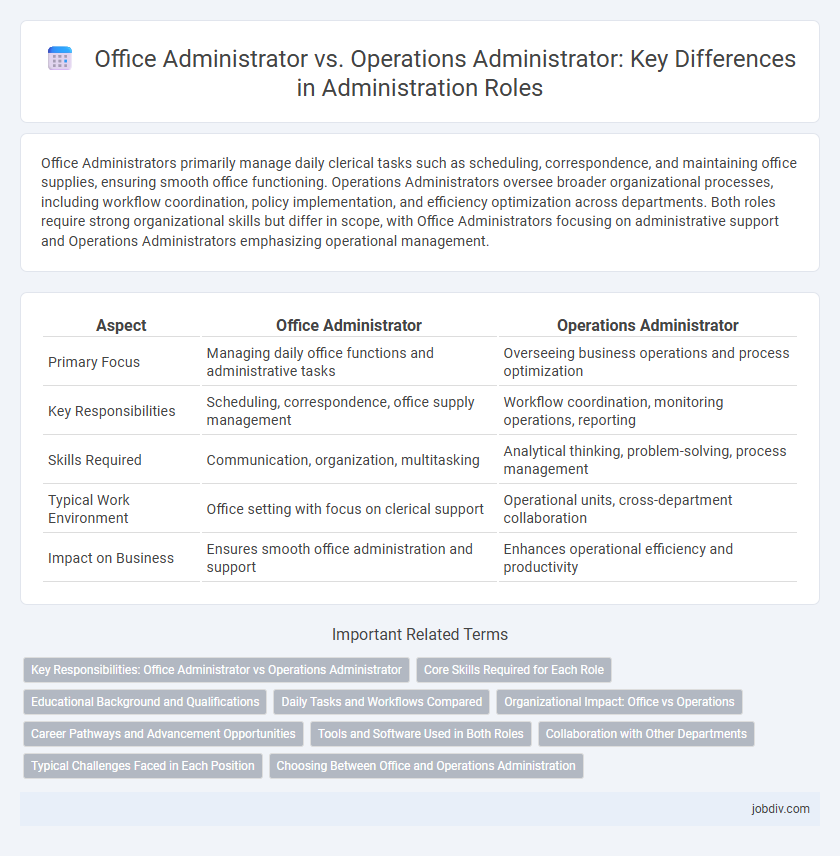Office Administrators primarily manage daily clerical tasks such as scheduling, correspondence, and maintaining office supplies, ensuring smooth office functioning. Operations Administrators oversee broader organizational processes, including workflow coordination, policy implementation, and efficiency optimization across departments. Both roles require strong organizational skills but differ in scope, with Office Administrators focusing on administrative support and Operations Administrators emphasizing operational management.
Table of Comparison
| Aspect | Office Administrator | Operations Administrator |
|---|---|---|
| Primary Focus | Managing daily office functions and administrative tasks | Overseeing business operations and process optimization |
| Key Responsibilities | Scheduling, correspondence, office supply management | Workflow coordination, monitoring operations, reporting |
| Skills Required | Communication, organization, multitasking | Analytical thinking, problem-solving, process management |
| Typical Work Environment | Office setting with focus on clerical support | Operational units, cross-department collaboration |
| Impact on Business | Ensures smooth office administration and support | Enhances operational efficiency and productivity |
Key Responsibilities: Office Administrator vs Operations Administrator
Office Administrators manage daily office functions, including scheduling, correspondence, and maintaining office supplies to ensure smooth administrative workflow. Operations Administrators focus on optimizing internal processes, overseeing project implementation, and coordinating resources to enhance operational efficiency. Both roles require strong organizational skills, but Office Administrators emphasize clerical duties, while Operations Administrators prioritize process management and operational support.
Core Skills Required for Each Role
Office Administrators excel in organizational skills, proficiency in office software, and effective communication to manage schedules, correspondence, and clerical tasks efficiently. Operations Administrators require strong analytical abilities, process optimization expertise, and knowledge of supply chain or logistics management to oversee daily operational workflows and improve productivity. Both roles demand problem-solving capabilities and attention to detail, yet Operations Administrators often handle more strategic functions aligned with business processes.
Educational Background and Qualifications
Office Administrators typically hold a diploma or associate degree in business administration or office management, emphasizing skills in communication, organization, and basic accounting. Operations Administrators often possess a bachelor's degree in business administration, operations management, or industrial engineering, highlighting expertise in process optimization, project management, and strategic planning. Certifications such as Certified Administrative Professional (CAP) benefit Office Administrators, while Operations Administrators may pursue Lean Six Sigma or PMP certifications to enhance operational efficiency credentials.
Daily Tasks and Workflows Compared
Office Administrators focus on managing daily office operations such as scheduling appointments, handling correspondence, and maintaining office supplies to ensure efficient workflow. Operations Administrators oversee broader business processes, including coordinating between departments, monitoring project timelines, and optimizing operational procedures. Both roles require strong organizational skills, but the Office Administrator's tasks are more clerical, while the Operations Administrator handles strategic execution of business functions.
Organizational Impact: Office vs Operations
Office Administrators enhance organizational efficiency by managing daily office tasks, coordinating communication, and supporting staff, which ensures a smooth work environment. Operations Administrators focus on optimizing business processes, resource allocation, and workflow management to improve overall productivity and operational effectiveness. The primary organizational impact lies in Office Administrators maintaining internal office harmony while Operations Administrators drive strategic process improvements.
Career Pathways and Advancement Opportunities
Office Administrators typically manage clerical tasks, scheduling, and communication flow, providing foundational administrative experience that can lead to roles like Executive Assistant or Office Manager. Operations Administrators focus on optimizing business processes, coordinating cross-departmental activities, and improving operational efficiency, positioning them for advancement into Operations Management or Project Coordinator roles. Both pathways offer career growth, with Office Administration emphasizing personnel and communication skills, while Operations Administration prioritizes process improvement and strategic planning.
Tools and Software Used in Both Roles
Office Administrators commonly use Microsoft Office Suite, Google Workspace, and scheduling tools such as Outlook and Calendly to manage calendars, emails, and document preparation. Operations Administrators rely on project management software like Asana, Trello, or Monday.com, along with enterprise resource planning (ERP) systems such as SAP or Oracle to oversee workflows and optimize operational processes. Both roles utilize communication platforms like Slack or Microsoft Teams to facilitate team coordination and maintain productivity.
Collaboration with Other Departments
Office Administrators coordinate closely with Human Resources, Finance, and IT departments to ensure smooth day-to-day office functions and resource allocation. Operations Administrators collaborate extensively with Production, Logistics, and Quality Control teams to optimize workflow efficiency and maintain operational standards. Effective interdepartmental communication is critical for both roles to align organizational goals and streamline processes.
Typical Challenges Faced in Each Position
Office Administrators often face challenges related to managing diverse administrative tasks, coordinating schedules, and maintaining effective communication within the office environment. Operations Administrators typically struggle with optimizing workflows, implementing process improvements, and ensuring compliance with company policies and regulatory requirements. Both roles require strong organizational skills, but Operations Administrators frequently deal with more complex logistical and strategic obstacles.
Choosing Between Office and Operations Administration
Choosing between an Office Administrator and an Operations Administrator depends on the specific needs of the organization; an Office Administrator typically manages front-desk operations, scheduling, and internal communication, ensuring smooth daily office functions. In contrast, an Operations Administrator focuses on coordinating workflow processes, supply chain management, and supporting broader business operations to improve efficiency. Understanding the scope of responsibilities and aligning them with organizational goals helps in selecting the right role for optimal administrative support.
Office Administrator vs Operations Administrator Infographic

 jobdiv.com
jobdiv.com